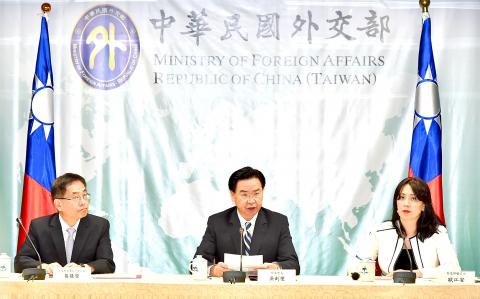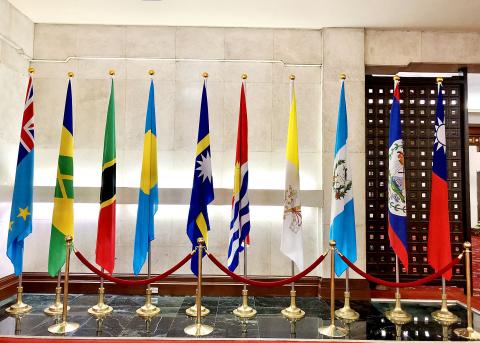Taiwan yesterday lost a second diplomatic ally in a week after Kiribati decided to switch recognition to China.
Taiwan “regrets and strongly condemns” Kiribati for disregarding the years of assistance and friendship that Taipei had extended to Tarawa, Minister of Foreign Affairs Joseph Wu (吳釗燮) told a news conference at 1pm yesterday, adding that the Ministry of Foreign Affairs received a formal notice of the termination of relations from Kiribati at about 11am.
The government “hereby declares that it is terminating diplomatic relations with the Republic of Kiribati effective immediately, ending all bilateral cooperative projects and recalling the staff of its embassy, technical mission and medical mission stationed in Kiribati,” Wu said.

Photo: Tu Chien-jung, Taipei Times
The Solomon Islands cut ties with Taipei on Monday, making Kiribati the seventh to switch allegiance to Beijing since 2016, following Sao Tome and Principe, Panama, the Dominican Republic, Burkina Faso, and El Salvador.
Taiwan now has only 15 diplomatic partners, including four in the Pacific.
Kiribati had demanded that Taiwan help it acquire airplanes for “commercial purposes,” which is not consistent with the spirit of the International Cooperation and Development Act (國際合作發展法), which aims to develop public infrastructure, Wu said.

Photo: CNA
Taipei’s proposed program to obtain the aircraft under a commercial loan was rejected, while Beijing promised to offer Tarawa several civilian aircraft and commercial ferries, he said.
Since taking office in 2016, Kiribatian President Taneti Mamau and some members of his ruling Tobwaan Kiribati Party have engaged in frequent exchanges with China, Wu said, adding that Beijing has used fisheries and other commercial investments to extend its presence in the Pacific country.
Beijing’s campaign to push Taiwan’s allies to sever formal relations aims to suppress the nation’s international presence and force Taiwanese to accept China’s “one country, two systems” framework, he said.
Asked if the government has a strategy to “stop the bleeding,” Wu said that the ministry has required overseas officials to maintain close communications with local officials at each allied nation.
Despite some “minor signs” of crisis in the four remaining Pacific allies — Palau, Nauru, Tuvalu and the Marshall Islands — their ties with Taiwan “are nothing to worry about,” he said.
The government has not yet discussed whether to adjust overall foreign policy, Wu said, adding that informal relations with other countries are also crucial for Taiwan.
Presidential Office spokesman Ting Yun-kung (丁允恭) later yesterday confirmed that Wu had asked President Tsai Ing-wen (蔡英文) to take disciplinary action, but added that Tsai has asked Wu to stay in his position, as China’s actions are clearly to blame for Taiwan’s diplomatic setbacks.
“China has chosen this time to strike a series of blows against Taiwan, because only slightly more than 100 days remain until the presidential election,” Tsai said, adding that Taiwan would never accept the “one country, two systems” formula.
Kiribati has made a big mistake by leaving as sincere a friend as Taiwan to become China’s pawn, she added.
Separately yesterday, the American Institute in Taiwan (AIT) expressed disappointment over Kiribati’s decision to abandon its ties with Taipei, saying that Taiwan is a democratic success story, a reliable partner and a force for good in the world.
“We continue to express concerns with China’s campaign to pressure countries to discontinue ties with Taiwan. We continue to have an interest in cross-strait peace and stability,” the AIT said in a statement.
Additional reporting by agencies

CHAOS: Iranians took to the streets playing celebratory music after reports of Khamenei’s death on Saturday, while mourners also gathered in Tehran yesterday Iranian Supreme Leader Ayatollah Ali Khamenei was killed in a major attack on Iran launched by Israel and the US, throwing the future of the Islamic republic into doubt and raising the risk of regional instability. Iranian state television and the state-run IRNA news agency announced the 86-year-old’s death early yesterday. US President Donald Trump said it gave Iranians their “greatest chance” to “take back” their country. The announcements came after a joint US and Israeli aerial bombardment that targeted Iranian military and governmental sites. Trump said the “heavy and pinpoint bombing” would continue through the week or as long

TRUST: The KMT said it respected the US’ timing and considerations, and hoped it would continue to honor its commitments to helping Taiwan bolster its defenses and deterrence US President Donald Trump is delaying a multibillion-dollar arms sale to Taiwan to ensure his visit to Beijing is successful, a New York Times report said. The weapons sales package has stalled in the US Department of State, the report said, citing US officials it did not identify. The White House has told agencies not to push forward ahead of Trump’s meeting with Chinese President Xi Jinping (習近平), it said. The two last month held a phone call to discuss trade and geopolitical flashpoints ahead of the summit. Xi raised the Taiwan issue and urged the US to handle arms sales to

State-run CPC Corp, Taiwan (CPC, 台灣中油) yesterday said that it had confirmed on Saturday night with its liquefied natural gas (LNG) and crude oil suppliers that shipments are proceeding as scheduled and that domestic supplies remain unaffected. The CPC yesterday announced the gasoline and diesel prices will rise by NT$0.2 and NT$0.4 per liter, respectively, starting Monday, citing Middle East tensions and blizzards in the eastern United States. CPC also iterated it has been reducing the proportion of crude oil imports from the Middle East and diversifying its supply sources in the past few years in response to geopolitical risks, expanding

Pro-democracy media tycoon Jimmy Lai’s (黎智英) fraud conviction and prison sentence were yesterday overturned by a Hong Kong court, in a surprise legal decision that comes soon after Lai was jailed for 20 years on a separate national security charge. Judges Jeremy Poon (潘兆初), Anthea Pang (彭寶琴) and Derek Pang (彭偉昌) said in the judgement that they allowed the appeal from Lai, and another defendant in the case, to proceed, as a lower court judge had “erred.” “The Court of Appeal gave them leave to appeal against their conviction, allowed their appeals, quashed the convictions and set aside the sentences,” the judges